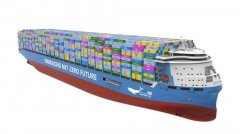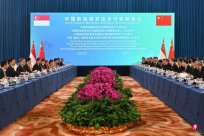The third meeting of the cooperation mechanism of Korean and Chinese marine affairs dialogue will be held in South Korea next year.
Yonhap News Agency on Wednesday (December 6) quoted sources from the Ministry of Foreign Affairs of South Korea that Jiang Yingxin, a reviewer of the Northeast Asian Bureau of the South Korean Ministry of Foreign Affairs, and Yang Renhuo, deputy director of the Chinese Ministry of Foreign Affairs and the Deputy Director of the Department of Marine Affairs.Hosted a deputy department -level meeting of the sea -related issues and reached an agreement on the above content.
The two sides discussed at the meeting to strengthen the substantial cooperation and the problem involving the ocean to be solved.The two sides agreed that South Korea, China respects the legitimate marine rights and interests, mutual benefit, and the stability of marine order based on international law.The two sides agreed to continue to expand exchanges in the marine field, and further deepen the substantial cooperation in maritime -related fields such as maritime environment, technology, fishery, safety (search and rescue, etc.).
The cooperation mechanism of the Korean and China Marine Affairs Dialogue is a bureau -level negotiation mechanism for comprehensive coordination and negotiations between the two countries. The first two meetings were held in April and June 2022, respectively.
According to the official website of the Ministry of Foreign Affairs of China, the first two meetings of the China -Korea Marine Affairs Dialogue and Cooperation Mechanism were held in a video manner.The two meetings were co -chaired by Hong Liang, the director of the Ministry of Foreign Affairs and the Department of Marine Affairs, and Cui Xide, director of the Northeast Asia Bureau of the Ministry of Foreign Affairs of South Korea.
At the first meeting of April 2021, the two sides agreed that the current health and stable development of China -South Korea relations and the launch of the two countries' marine affairs dialogue and cooperation mechanisms are conducive to expanding marine exchanges and cooperation between the two countries and enriching the China -Korea strategy strategy.Partnership connotation.
The two parties agreed to the mechanism framework and operating model, introduced their respective marine policies and governance situations, reviewed and looked forward to the two countries' sea -related exchanges and pragmatic cooperation, clarified the direction and ideas of the next steps, agreed to deepen the involvement involved in involvedExchange and cooperation in the fields of Hai Technology, Environmental Protection, Fisheries, Search and Rescue, Shipping, Defense and Law Enforcement.The two sides also agreed to strengthen communication and coordination on the exchanges of the seas of the two countries, and agreed to strengthen communication and coordination, sensitive issues in proper places, enhance mutual trust, and strive to build the Huanghai into a sea of peace, friendship, and cooperation.
The two sides also opposed Japan's disregard of the international community, especially China and South Korea, in particular, and unilaterally decided to express strong dissatisfaction with the Fukushima Nuclear Power Station accident nuclear waste water.The two sides urged the Japanese to fully negotiate with international institutions and neighboring countries, and on the basis of the substantial participation of relevant countries and international institutions, the Fukushima nuclear waste water was carefully handled.
At the second meeting in June last year, the two sides actively evaluated the cooperation mechanism of China -South Korea marine affairs dialogue and cooperation mechanism in promoting the two countries' exchanges and cooperation between the two countries, properly controlled the differences in maritime contradictions, and maintained the stability of the maritime situation.The important role is to continue to further promote the construction of mechanisms, solve the treatment of maritime issues through negotiations and negotiation, accelerate the seaside -regulating negotiations, and strengthen pragmatic cooperation in marine scientific research, ecological and environmental protection, shipping, fishery, maritime law enforcement, maritime safety and maritime and air safety.The two sides also exchanged opinions on the issue of Fukushima nuclear waste water in Japan, and expressed concern on the Japanese -side sea programs.



